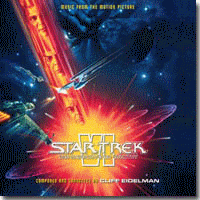 Last week Intrada released another expanded Star Trek score on CD. This time it is Star Trek VI: The Undiscovered Country by Cliff Eidelman. With this entry, almost all of the original Star Trek film scores have been released in full except for Star Trek: The Motion Picture (though an expanded score was released for the film’s 20th anniversary, it is still missing a few select cues from the film.)
Last week Intrada released another expanded Star Trek score on CD. This time it is Star Trek VI: The Undiscovered Country by Cliff Eidelman. With this entry, almost all of the original Star Trek film scores have been released in full except for Star Trek: The Motion Picture (though an expanded score was released for the film’s 20th anniversary, it is still missing a few select cues from the film.)
As with many of the other earlier complete releases, Intrada has released this score as a 2-CD set featuring the complete score as it was heard in the film on disc one, and the score as it had been originally released on disc two. Depending on how much of a completist you are, this may or may not work for you. For me, it’s not really worth it. Why? Because while the release has wonderfully detailed liner notes (more on that in a second), when it breaks down the tracks on disc 2, more times than not is says something akin to “this is the same as what you hear on disc one”… sometimes truncated, sometimes mixed with another track. Honestly, I’d be more interested in alternate takes, a listen to what might have been, etc.
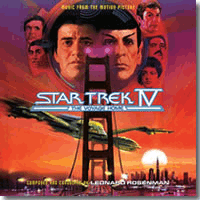 Take, for example, Intrada’s release of Star Trek IV: The Voyage Home, which I reviewed here. Granted there wasn’t nearly as much music in the film so all of it plus the extras, fit on one disc. But aside from that, we did get the album versions of SOME of the tracks. Obviously the ones that were the same were left off. We were also treated to alternate cues such as the main title theme as done in the style of Alexander Courage’s original theme for Star Trek and a much more subdued version of the End Title. We even got the full version of the punk song “I Hate You”, written and performed specifically for the scene on the bus where Spock neck pinches an annoying punk.
Take, for example, Intrada’s release of Star Trek IV: The Voyage Home, which I reviewed here. Granted there wasn’t nearly as much music in the film so all of it plus the extras, fit on one disc. But aside from that, we did get the album versions of SOME of the tracks. Obviously the ones that were the same were left off. We were also treated to alternate cues such as the main title theme as done in the style of Alexander Courage’s original theme for Star Trek and a much more subdued version of the End Title. We even got the full version of the punk song “I Hate You”, written and performed specifically for the scene on the bus where Spock neck pinches an annoying punk.
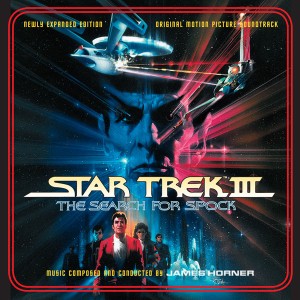 Retrograde Records’ and Film Score Monthly’s release of the 2-disc set for Star Trek III: The Search for Spock has a similar issue, though not quite as problematic. Here the complete score fills an entire disc without problem. The album versions of some of the tracks have VERY noticeable differences and are therefore on disc two. The opening strings in the main titles are completely different. The same goes for the opening of “Stealing The Enterprise”. The “Klingons” track is VERY different from what appeared in the film. And with all this we’re treated to the pop version of the movie’s theme called “The Search for Spock”. None of this would have fit on disc one, and to put only these tracks on disc two would have been a bit much to ask anyone to pay for alone, so adding the full album version of the soundtrack makes more sense.
Retrograde Records’ and Film Score Monthly’s release of the 2-disc set for Star Trek III: The Search for Spock has a similar issue, though not quite as problematic. Here the complete score fills an entire disc without problem. The album versions of some of the tracks have VERY noticeable differences and are therefore on disc two. The opening strings in the main titles are completely different. The same goes for the opening of “Stealing The Enterprise”. The “Klingons” track is VERY different from what appeared in the film. And with all this we’re treated to the pop version of the movie’s theme called “The Search for Spock”. None of this would have fit on disc one, and to put only these tracks on disc two would have been a bit much to ask anyone to pay for alone, so adding the full album version of the soundtrack makes more sense.
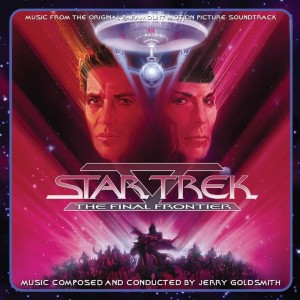 In La-La Land’s release of the score from Star Trek V: The Final Frontier, we are also offered a 2-disc set. This one includes the entire score on disc one, the entire original album on disc two and MANY extras including alternate takes on the “Main Titles” and “A Busy Man”, the film version of Uhura’s song “The Moon’s a Window To Heaven” and Spock playing “Row, Row, Row Your Boat” on the Vulcan Lyre. You truly feel like you’re getting your money’s worth here.
In La-La Land’s release of the score from Star Trek V: The Final Frontier, we are also offered a 2-disc set. This one includes the entire score on disc one, the entire original album on disc two and MANY extras including alternate takes on the “Main Titles” and “A Busy Man”, the film version of Uhura’s song “The Moon’s a Window To Heaven” and Spock playing “Row, Row, Row Your Boat” on the Vulcan Lyre. You truly feel like you’re getting your money’s worth here.
But putting aside the merits of one disc over two, how does the score hold up? Cliff Eidelman’s music for Star Trek VI is very dark and somber for a Star Trek film which, while not holding with tradition, is exactly what director Nicholas Meyer wanted. The liner notes for the film make extensive use of interviews with Meyer and Eidelman to paint a very clear picture of how this score came about. Originally the studio was going to license Holst’s “The Planets” to use in the film (this was before it later fell into public domain.) After hearing Eidelman’s take on the score, they changed their minds (though you can very clearly hear Holst’s influence on Eidelman’s work.).
The notes also give a clearer insight into the intention and arc of the music. The score itself is perfectly fitting with the tone of the film as it progresses. While the bulk is indeed dark and ominous, it is only because of the tensions that permeate the earlier portions of the film. Filled with political intrigue and racial tensions, a rousing score would hardly seem appropriate.
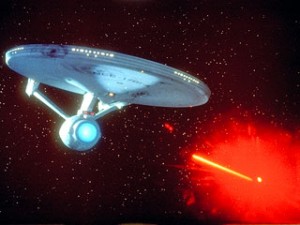 But as the film reaches its climax, so too does the music. The high tension piece “The Battle for Peace” heightens the action pacing of the sequence. In this film you, once again, felt that the Enterprise was in real danger. The growing tension in the music underscores that perfectly culminating in the heroic beats in the destruction of the Klingon ship.
But as the film reaches its climax, so too does the music. The high tension piece “The Battle for Peace” heightens the action pacing of the sequence. In this film you, once again, felt that the Enterprise was in real danger. The growing tension in the music underscores that perfectly culminating in the heroic beats in the destruction of the Klingon ship.
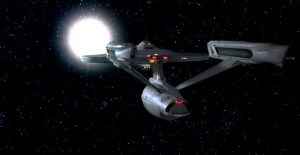 Finally, as the Enterprise heads off into the sunset the music takes on the hopeful tone that we’ve come to expect from Star Trek, and finally raises into heroic fanfare as we leave the theater.
Finally, as the Enterprise heads off into the sunset the music takes on the hopeful tone that we’ve come to expect from Star Trek, and finally raises into heroic fanfare as we leave the theater.
This, above all else, makes the score a perfect companion to the film from which it came.
The Intrada release does come with some nifty extras despite my complaints earlier. These include alternate takes on “Guess Who’s Coming” and the “Sign Off”. But for me, the coolest gems in the extras department are two takes from the music from the trailer to the movie! These pieces were especially commissioned by Paramount, to be written by Eidelman, for the film’s trailers. For those who don’t know, this isn’t a common practice.
The other day I saw a trailer for the film Super 8. It used music from the film Cocoon. The music from Aliens made its way into MANY film trailers in the 90s. And if you really want to hear some funny stuff, pick up John Beal’s TRAILER PROJECT: COMING SOON – PREVIEWS OF COMING ATTRACTIONS. It’s a 2-CD set of music that Beal wrote for theatrical trailers. Some of it was modified versions of other film music, others just downright copies.
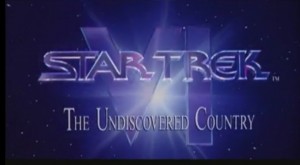 But back to Eidelman’s trailer music for Star Trek VI. This music incorporated themes taken directly from the film in shortened form, culminating in a new take on Alexander Courage’s theme. Courage’s theme here is distilled into a brief heroic sting the likes of which were virtually unheard of and, to me, MADE the trailers PERFECT!
But back to Eidelman’s trailer music for Star Trek VI. This music incorporated themes taken directly from the film in shortened form, culminating in a new take on Alexander Courage’s theme. Courage’s theme here is distilled into a brief heroic sting the likes of which were virtually unheard of and, to me, MADE the trailers PERFECT!
All in all, despite a little too much redundancy for my tastes on disc two, this is still a buy. The extensively well-written liner notes, the wonderfully reproduced audio and the extras more than make up for the other stuff. Head on over to Intrada and give a listen for yourself!